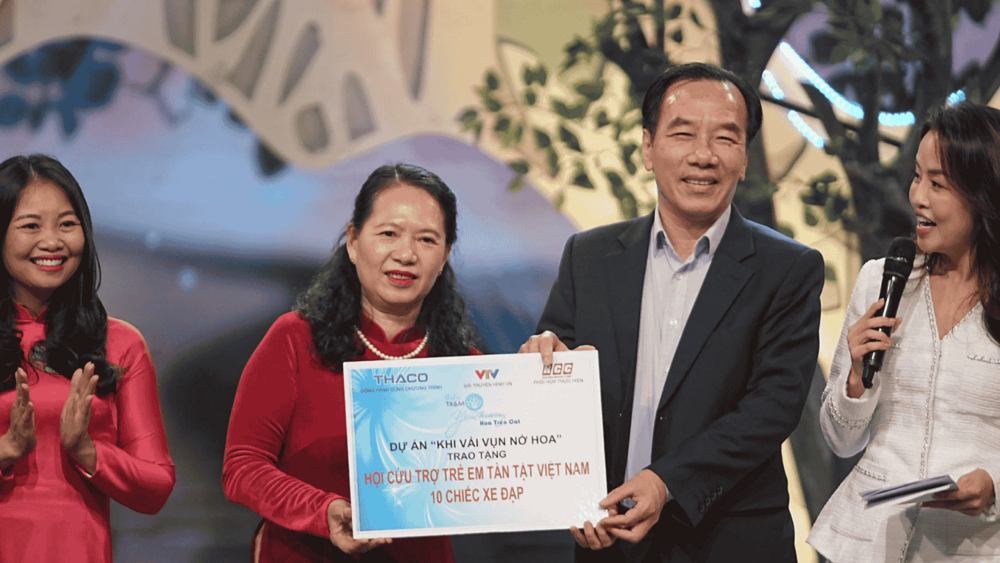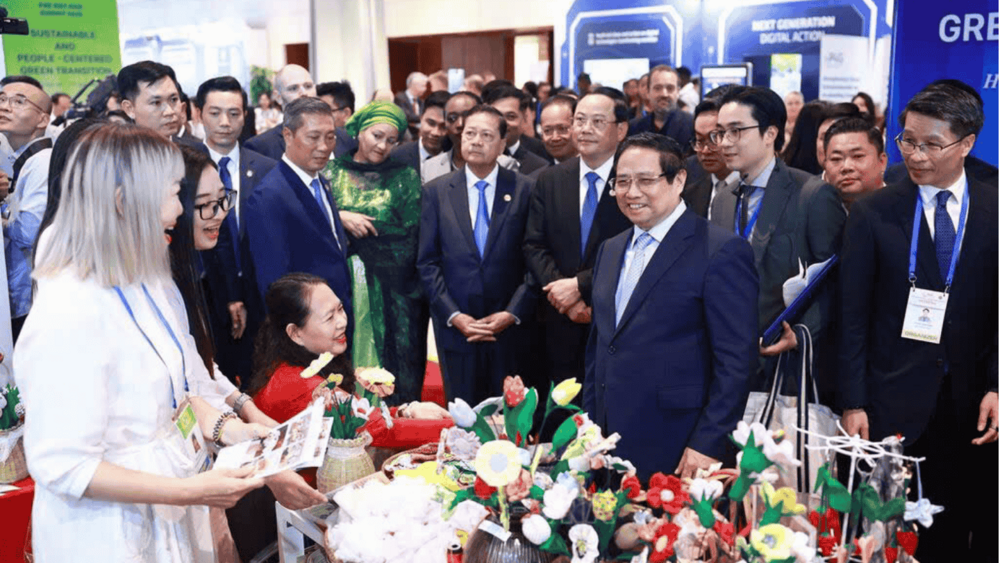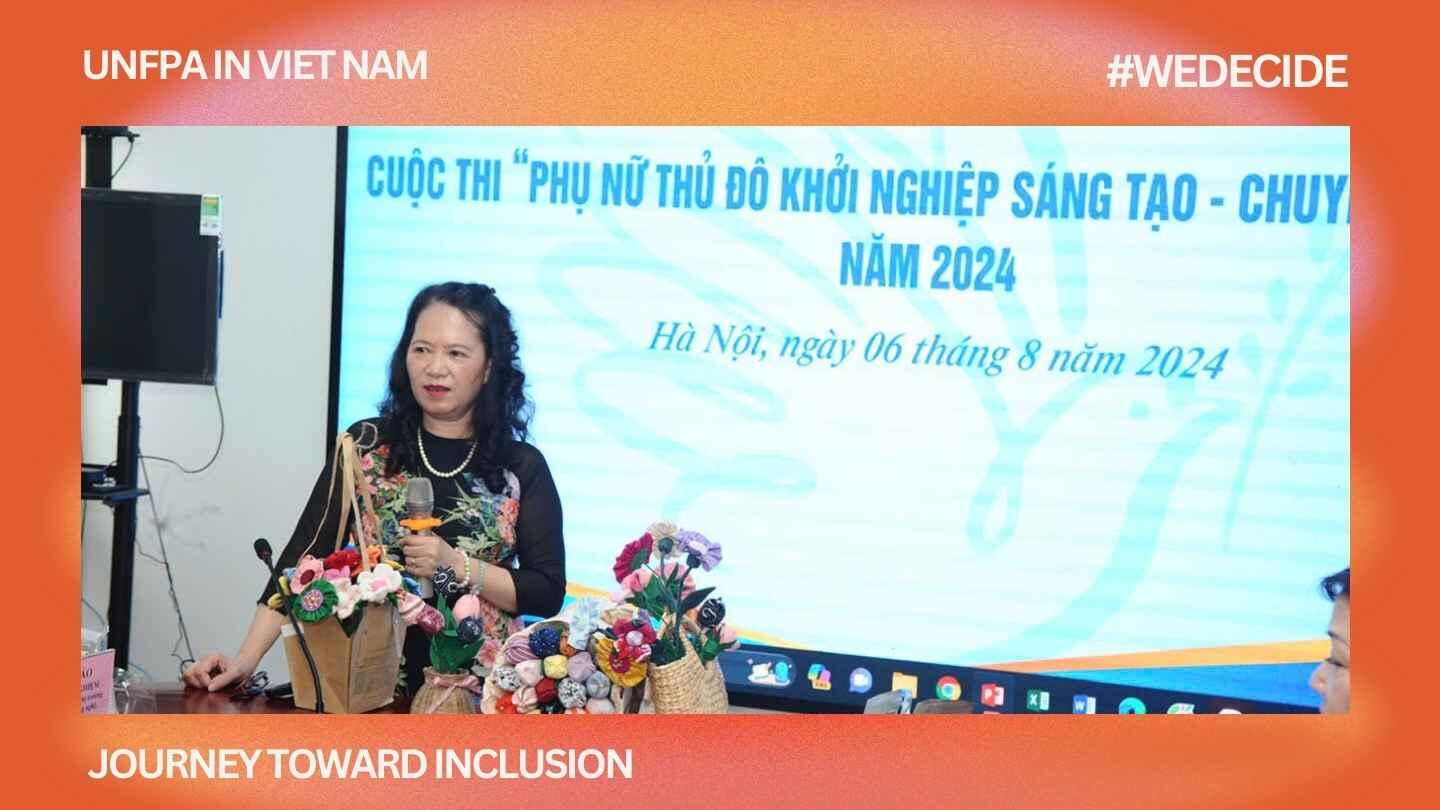Mrs. Hiền sits quietly in a small café tucked away in Hanoi’s Hoàn Kiếm District. She tells me she chose this café partly because it’s close to home, but also because the sidewalk is wide enough for her to move freely—her legs have weakened over time. And maybe, most of all, because “the owner here is so kind and supportive of people with disabilities.”
As she begins to tell the story of her life, everything traces back to a single, life-changing fever:
“I was born healthy, but after a bout of polio at just one year old, I was left paralyzed on one side of my body. My family did everything they could, but the damage had been done—I lost all movement on one side.”
The physical and emotional distances she had to cross were immense. Still, with unyielding determination and her family’s unwavering support, she overcame even the seemingly impossible—like climbing all the way to the fourth floor of a building to attend class.
“At first, I didn’t feel too different because my family was always there to help. But I realized how different I was when I started school in the 70s, during the war years, when everything was difficult. On my first day, other kids made fun of me. They would bump into me, push me over. That’s when I knew—I wasn’t like everyone else,” she recalls, her voice catching, eyes welling up.
As a seven-year-old with dreams too big for her fragile frame, Mrs. Hiền was deeply hurt by the discrimination she faced. The bullying made her withdraw, sometimes even question her own worth. There were many times she told her parents she wanted to quit school.
But even though anxiety loomed over her like a stormcloud, giving up wasn’t easy—not with her parents cheering her on. Despite being teased, shoved, and knocked down, she had one unshakable pillar of strength: her family.
“My father was a gentle soul. He never yelled, just guided me calmly. I was seven when he told me, ‘If you study hard, they’ll stop bullying you.’ I believed him, and I poured everything into my studies.”
By secondary school, Mrs. Hiền had discovered her love for sewing. Her parents encouraged her to finish high school—and she did, with determination and grace. She even passed her university entrance exams. But due to her health, she chose a vocational path. From then on, starting in the early 1980s, sewing became both her career and her calling.

"Maybe I should just give up." But her dream kept pulling her forward.
When she first started learning to sew, the obstacles weren’t just technical—they were physical. Her body could only go so far, but her spirit refused to yield.
“I wanted to learn from this famous tailor in Hanoi. But their workshop was on the fourth floor—up a wooden staircase. The first day, I stood there and thought, ‘Maybe I should find another place. There’s no way I can make it up there.’ But the next day, I told myself to try. I climbed step by step, pausing at each floor. And I made it. I kept telling myself, ‘If I try hard enough, luck will come.’ And I climbed. Every day.”
Today, Mrs. Hiền is a skilled seamstress with a loyal clientele, able to support herself and her family. Still, the inner scars of insecurity lingered—until she found her community.
In 2009, she joined the local association for people with disabilities. “Meeting people like me gave me confidence. I started going out more, entering contests. I felt seen.”
One such competition was the “The Loving Lens” photo contest organized by the UNFPA. Hiền submitted three photos, each telling the story of disabled individuals in everyday life—interacting with family, children, and community.
The first photo is taken in a sewing class. In it, both disabled and non-disabled participants are learning to craft flowers from recycled fabric scraps. “It’s really hard for a person with disabilities to make those flowers,” she says. That flower-making workshop was part of a project Hiền proposed: “Recycled Fabric Flowers – A Livelihood for Disabled Women.” It earned her a spot in the top 15 out of 127 entries in the 2024 Women’s Green Innovation Startup Contest in Hanoi.

Like torn fabric transformed into radiant blooms, when people with disabilities are included, empowered, and given purpose—they too blossom in their own beautiful ways.
But even now, the road remains rough.
“Despite policy support, disabled people still face so many barriers—especially with transportation. Sidewalks, bus steps—they’re all hard to access. The hearing-impaired need clear signage. The blind need guided paths. People with intellectual disabilities often need constant assistance. But those who are deaf or blind can absolutely live independently, just like anyone else. It’s the barriers—not the bodies—that disable us.”
And for disabled women, the weight is often doubled.
“Pregnancy, childbirth, and raising children are especially hard for disabled women,” she shares. In 2022, the Hoàn Kiếm District Disability Association ran a project funded by the Finnish Abilis Foundation on sexual and reproductive rights. They offered workshops on everything from safe sex and contraception to legal rights and protection from abuse.
“Many disabled people don’t have access to this kind of information. Some have two or three kids without knowing how to care for them. In some tragic cases, parents even resort to sterilizing their children out of desperation.”
That’s why she is now passionate about pushing for more education on reproductive and sexual health—especially for disabled women. “We need clear, simple, detailed knowledge so they can protect themselves from violence and exploitation.”
"Now, I just want to help as many people as I can."
Mrs. Hiền continues to teach sewing, helping others earn an income and build confidence. Her happiest moments now are seeing her students sell their products, earn money, and feel proud.
At this stage in life, Hiền has found joy not just in overcoming—but in uplifting. A woman with disabilities, standing for people with disabilities, so that even the most torn of lives can bloom into brilliant flowers.
This story is part of the WeDecide series by the United Nations Population Fund (UNFPA) in honor of Vietnam’s Disability Day (April 18). UNFPA supports the right of every individual—including persons with disabilities—to make choices about their lives, with dignity, inclusion, and equality at the heart of every decision.
______
About UNFPA's mission:
UNFPA – the United Nations Population Fund – is the UN agency focused on sexual and reproductive health. Our mission is to deliver a world where every pregnancy is wanted, every childbirth is safe, and every young person’s potential is fulfilled.
About the UNFPA WeDecide programme:
WeDecide is a global initiative by UNFPA, supported by the Government of Spain, to promote human rights and social inclusion for women and youth with disabilities — especially in areas like sexual and reproductive health, and prevention of gender-based violence.
The program aims to create rights-based interventions aligned with international standards and guidelines, ensuring the direct participation of people with disabilities in the design and implementation process. It particularly focuses on women and girls with disabilities, who often face significant barriers in accessing health services, education, protection, and information.
Through WeDecide, UNFPA works to ensure everyone has the right to make decisions about their own bodies and lives — free from discrimination and violence.


